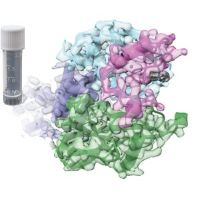Specification
| Description | Recombinant protein from the full-length sequence of Homo sapiens transcriptional adaptor 2A (TADA2A), transcript variant 2 (NM_133439). |
| Organism | Homo sapiens (Human) |
| Expression Host | Human Cells |
| Tag Info | His or DYKDDDDK. Please contact us if you need further information or require specific designed tag. |
| Purity | Greater than 90% by SDS-PAGE gel |
| Uniprot ID | O75478 |
| Entry Name | TAD2A_HUMAN |
| Gene Names | TADA2A TADA2L KL04P |
| Alternative Gene Names | TADA2L |
| Alternative Protein Names | Transcriptional adapter 2-alpha (Transcriptional adapter 2-like) (ADA2-like protein) |
| Application | Antigens, Western, ELISA and other in vitro binding or in vivo functional assays, and protein-protein interaction studies; For research & development use only! |
| Buffer | Purified protein formulated in a sterile solution of PBS buffer, pH7.2, without any preservatives |
| Endotoxin | Endotoxin level is < 0.1 ng/µg of protein (<1EU /µg) |
| Length | 443 |
| Molecular Weight(Da) | 51506 |
| Protein Sequence | (The sequence of expressed protein may have some variation from the sequence shown below. Please contact us for the exact sequence.) MDRLGPFSNDPSDKPPCRGCSSYLMEPYIKCAECGPPPFFLCLQCFTRGFEYKKHQSDHTYEIMTSDFPVLDPSWTAQEEMALLEAVMDCGFGNWQDVANQMCTKTKEECEKHYMKHFINNPLFASTLLNLKQAEEAKTADTAIPFHSTDDPPRPTFDSLLSRDMAGYMPARADFIEEFDNYAEWDLRDIDFVEDDSDILHALKMAVVDIYHSRLKERQRRKKIIRDHGLINLRKFQLMERRYPKEVQDLYETMRRFARIVGPVEHDKFIESHALEFELRREIKRLQEYRTAGITNFCSARTYDHLKKTREEERLKRTMLSEVLQYIQDSSACQQWLRRQADIDSGLSPSIPMASNSGRRSAPPLNLTGLPGTEKLNEKEKELCQMVRLVPGAYLEYKSALLNECNKQGGLRLAQARALIKIDVNKTRKIYDFLIREGYITKG |
Background
| Function | FUNCTION: Component of the ATAC complex, a complex with histone acetyltransferase activity on histones H3 and H4. Required for the function of some acidic activation domains, which activate transcription from a distant site (By similarity). Binds double-stranded DNA. Binds dinucleosomes, probably at the linker region between neighboring nucleosomes. Plays a role in chromatin remodeling. May promote TP53/p53 'Lys-321' acetylation, leading to reduced TP53 stability and transcriptional activity (PubMed:22644376). May also promote XRCC6 acetylation thus facilitating cell apoptosis in response to DNA damage (PubMed:22644376). {ECO:0000250|UniProtKB:Q8CHV6, ECO:0000269|PubMed:19103755, ECO:0000269|PubMed:22644376}. |
| Pathway | |
| Protein Families | |
| Tissue Specificity | Expressed in all tissues, but most abundantly in testis. |
QC Data
| Note | Please contact us for QC Data |
| Product Image (Reference Only) |  |

